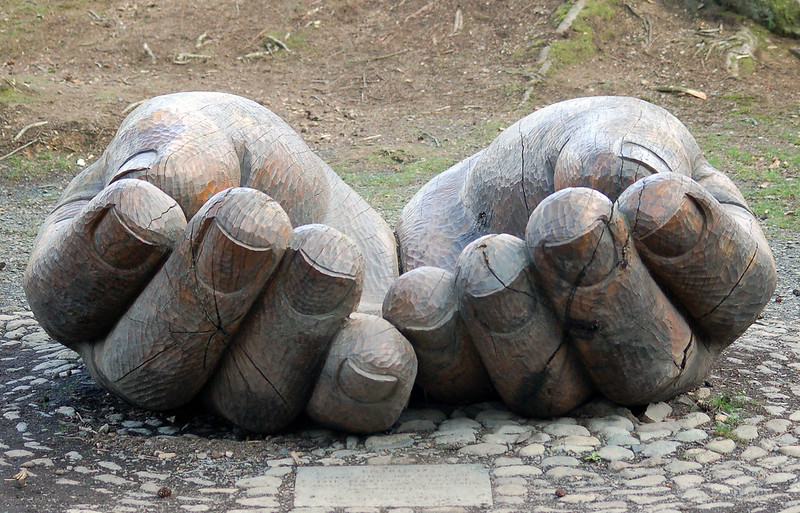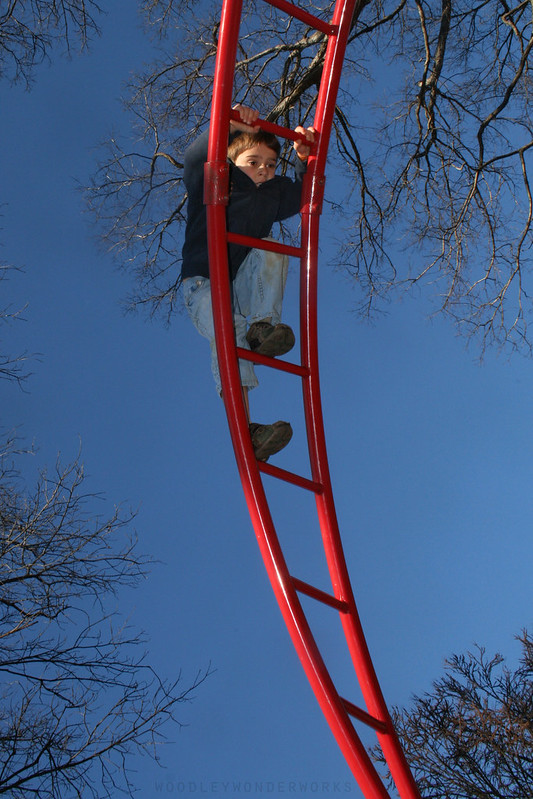The Giving Continuum
 I don’t give – regardless of the situation, there is no giving.
I don’t give – regardless of the situation, there is no giving.
I won’t give – in this situation, there is no giving.
I cannot give – there’s a reason for the non-giving.
I might give – there’s something about this situation that could result in giving.
I almost gave – there was strong consideration of giving.
I will give – in the future there will be giving.
I gave, but I got more – there was more getting than giving.
I gave, but I also got – there was a little getting, but far more giving.
I gave, but I got credit – getting credit helped, but there was giving.
I gave – in this situation, there was giving for the sake of giving.
I gave, and could spare it – there was surplus, and in this situation, there was giving.
I planned, saved, and gave – there was forethought to the giving.
I gave more than I saved – there was a lot of forethought, and far more giving.
I’ve found that the size of the gift doesn’t matter. What matters is the giving.
I’ve found that giving is for the giver.
I’ve found that giving is like getting twice.
I’ve found that giving creates givers.
Thanks for giving when you can.
Thanks for giving when it’s difficult for others to ask.
Thanks for giving when no one else sees the need.
Thanks for giving when no one is looking.
Wherever you are on the giving continuum, thanks for giving.
“Give a big hand to…..” by Andrew Pescod is licensed under CC BY-NC-SA 2.0
Regardless of the question, trust is the answer.
 If you want to make a difference, build trust.
If you want to make a difference, build trust.
If you want to build trust, do a project together.
If you want to build more trust, help the team do work they think is impossible.
If you want to build more trust, contribute to the project in the background.
If you want to build more trust, actively give credit to others.
If you want to build more trust, deny your involvement.
If you want to create change, build trust.
If you want to build trust, be patient.
If you want to build more trust, be more patient.
If you want to build more trust, check your ego at the door so you can be even more patient.
If you want to have influence, build trust.
If you want to build trust, do something for others.
If you want to build more trust, do something for others that keeps them out of trouble.
If you want to build more trust, do something for others that comes at your expense.
If you want to build more trust, do it all behind the scenes.
If you want to build more trust, plead ignorance.
If you want the next project to be successful, build trust.
If you want to build trust, deliver what you promise.
If you want to build more trust, deliver more than you promise.
If you want to build more trust, deliver more than you promise and give the credit to others.
If you want deep friendships, build trust.
If you want to build trust, give reinforcing feedback.
If you want to build more trust, give reinforcing and correcting feedback in equal amounts.
If you want to build trust, give reinforcing feedback in public and correcting feedback in private.
If you want your work to have meaning, build trust.
“[1823] Netted Pug (Eupithecia venosata)” by Bennyboymothman is licensed under CC BY 2.0
Goals, goals, goals.
 All goals are arbitrary, but some are more arbitrary than others.
All goals are arbitrary, but some are more arbitrary than others.
When your company treats goals like they’re not arbitrary, welcome to the US industrial complex.
What happens if you meet your year-end goals in June? Can you take off the rest of the year?
What happens if at year-end you meet only your mid-year goals? Can you retroactively declare your goals unreasonable?
What happens if at the start of the year you declare your year-end goals are unreasonable? Can you really know they’re unreasonable?
You can’t know a project’s completion date before the project is defined. That’s a rule.
Why does the strategic planning process demand due dates for projects that are yet to be defined?
The ideal future state may be ideal, but it will never be real.
When the work hasn’t been done before, you can’t know when you’ll be done.
When you don’t know when the work will be done, any due date will do.
A project’s completion date should be governed by the work content, not someone’s year-end bonus.
Resources and progress are joined at the hip. You can’t have one without the other.
If you are responsible for the work, you should be responsible for setting the completion date.
Goals are real, but they’re not really real.
“Arbitrary limitations II” by Marcin Wichary is licensed under CC BY 2.0
The Power of Purple
 Blue isn’t better than red, and red isn’t better than blue.
Blue isn’t better than red, and red isn’t better than blue.
What’s better is wearing a red shirt with blue pants or a blue shirt with red pants.
What’s better is wearing one blue sock and one red sock.
What’s better is swapping one of your red socks for a friend’s blue one. Two matching pairs.
What’s better is offering your blue sweater to someone standing in the cold in a red tee-shirt.
What’s better is offering your red rain boots to someone standing in a puddle wearing blue sneakers.
What’s better is a blue hat with a red stripe and a red hat with a blue stripe. That’s how it starts.
What’s better is respecting the right to wear red or blue and choosing to wear purple.
What’s better is being respectful of red, respectful of blue, and coming together under a purple tent.
What’s better is thanking people for wearing purple.
What better is when blue and red are proud to wear purple.
When red and blue become purple, competition becomes cooperation.
When blue and red come together, purple carries the day.
Purple is the most powerful color, but there can be no purple without red AND blue.
“Red + Blue = Purple” by darkday. is licensed under CC BY 2.0
Do you have a problem?
 If it’s your problem, fix it. If it’s not your problem, let someone else fix it.
If it’s your problem, fix it. If it’s not your problem, let someone else fix it.
If you fix someone else’s problem, you prevent the organization from fixing the root cause.
If you see a problem, say something.
If you see a problem, you have an obligation to do something, but not an obligation to fix it.
If someone tries to give you their stinky problem and you don’t accept it, it’s still theirs.
If you think the problem is a symptom of a bigger problem, fixing the small problem doesn’t fix anything.
If someone isn’t solving their problem, maybe they don’t know they have a problem.
If someone you care about has a problem, help them.
If someone you don’t care about has a problem, help them, too.
If you don’t have a problem, there can be no progress.
If you make progress, you likely solved a problem.
If you create the right problem the right way, you presuppose the right solution.
If you create the right problem in the right way, the right people will have to solve it.
If you want to create a compelling solution, shine a light on a compelling problem.
If there’s a big problem but no one wants to admit it, do the work that makes it look like the car crash it is.
If you shine a light on a big problem, the owner of the problem won’t like it.
If you shine a light on a big problem, make sure you’re in a position to help the problem owner.
If you’re not willing to contribute to solving the problem, you have no right to shine a light on it.
If you can’t solve the problem, it’s because you’ve defined it poorly.
Problem definition is problem-solving.
If you don’t have a problem, there’s no problem.
And if there’s no problem, there can be no solution. And that’s a big problem.
If you don’t have a problem, how can you have a solution?
If you want to create the right problem, create one that tugs on the ego.
If you want to shine a light on an ego-threatening problem, make it as compelling as a car crash – skid marks and all.
If shining a light on a problem will make someone look bad, give them an opportunity to own it, and then turn on the lights.
If shining a light on a problem will make someone look bad, so be it.
If it’s not your problem, keep your hands in your pockets or it will become your problem.
But no one can give you their problem without your consent.
If you’re damned if you do and damned if you don’t, the problem at hand isn’t your biggest problem.
If you see a problem but it’s not yours to fix, you’re not obliged to fix it, but you are obliged to shine a light on it.
When it comes to problems, when you see something, say something.
But, if shining a light on a big problem is a problem, well, you have a bigger problem.
“No Problem!” by Andy Morffew is licensed under CC BY 2.0
How to Know if Your Idea is Novel
 When your idea is novel, no one will steal it. No NDA required.
When your idea is novel, no one will steal it. No NDA required.
If your idea is truly novel, no one will value it. And that’s how you’ll know it’s novel.
When your idea is novel, no one will adopt it. This isn’t much of a stretch as, due to not-invented-here (NIH), no one will adopt anyone else’s idea – novel or not.
When your idea is novel, it will be misunderstood, even by you.
When your idea is novel, it will evolve into something else and then something else. And then it might be ready for Prime Time.
Novel ideas are like orchids – they need love beyond the worth of their blossom.
If your idea hasn’t failed three times, it’s not worth a damn.
The gestation period for novel ideas is long; if it comes together quickly, it’s not novel.
The best way to understand your novel idea is to make a prototype. And then another one.
Your first novel idea won’t work, but it will inform the next iteration. And that one won’t work either, and the cycle continues. But that’s how it goes with novel ideas.
If everyone likes your novel idea, it isn’t novel.
If no one likes your novel idea, you may be on to something.
If you’re not misunderstood, you’re doing it wrong.
If your dog likes your idea, you can’t say much because he loves you unconditionally and will always tell you what you want to hear.
If you think your novel idea will create a whole new product line in two years, your timeline is off by a factor of three, or five.
If your most successful business unit tries to squash your novel idea it’s because it threatens them. Stomp on the accelerator.
When you are known to give air cover to novel ideas, the best people want to work for you.
“it seemed like a good idea at the time” by woodleywonderworks is licensed under CC BY 2.0
How To Know If You Are Trusted
When you have trust, people tell you the truth.
When you don’t have trust, people tell you what you want to hear.
When you have trust, people tell you when others tell you what you want to hear.
When you don’t have trust, people watch others tell you what you want to hear.
When you have trust, you can talk about the inconvenient truth.
When you don’t have trust, you can’t.
When you have trust, you can ask for something unreasonable and people try to do it.
When you don’t have trust, they don’t.
When you have trust, you don’t need organizational power.
When you have organizational power, you better have trust.
When you have trust, you can violate the rules of success.
When you don’t have trust, you must toe the line.
When you have trust, you can go deep into the organization to get things done.
When you don’t have trust, you go to the managers and cross your fingers.
When you have trust, cross-organization alignment emerges mysteriously from the mist.
When you don’t have trust, you create a steering team.
When you do have trust, the Trust Network does whatever it takes.
When you don’t have trust, people work the rule.
When you have trust, you do what’s right.
When you don’t have trust, you do what you’re told.
When you have trust, you don’t need a corporate initiative because people do what you ask.
When you don’t have trust, you need a dedicated team to run your corporate initiatives.
When you have trust, you don’t need control.
When you don’t have trust, control works until you get tired.
When you have trust, productivity soars because people decide what to do and do it.
When you don’t have trust, your bandwidth limits productivity because you make all the decisions.
When you have trust, you send a team member to the meeting and empower them to speak for you.
When you don’t have trust, you call the meeting, you do the talking, and everyone else listens.
When you have trust, it’s because you’ve earned it.
When you don’t have trust, it’s because you haven’t.
If I had to choose between trust and control, I’d choose trust.
Trust is more powerful than control.
Image credit — “Hawk Conservancy Trust, Andover” by MarilynJane is licensed under CC BY 2.0
The truth can set you free, but only if you tell it.
Your truth is what you see. Your truth is what you think. Your truth is what feel. Your truth is what you say. Your truth is what you do.
If you see something, say something.
If no one wants to hear it, that’s on them.
If your truth differs from common believe, I want to hear it.
If your truth differs from common believe and no one wants to hear it, that’s troubling.
If you don’t speak your truth, that’s on you.
If you speak it and they dismiss it, that’s on them.
Your truth is your truth, and no one can take that away from you.
When someone tries to take your truth from you, shame on them.
Your truth is your truth. Full stop.
And even if it turns out to be misaligned with how things are, it’s still your responsibility to tell it.
If your company makes it difficult for you to speak your truth, you’re still obliged to speak it.
If your company makes it difficult for you to speak your truth, they don’t value you.
When your truth turns out to be misaligned with how things are, thank you for telling it.
You’ve provided a valuable perspective that helped us see things more clearly.
If you’re striving for your next promotion, it can be difficult to speak your dissenting truth.
If it’s difficult to speak your dissenting truth, instead of promotion, think relocation.
If you feel you must yell your dissenting truth, you’re not confident in it.
If you’re confident in your truth and you still feel you must yell it, you have a bigger problem.
When you know your truth is standing on bedrock, there’s no need to argue.
When someone argues with your bedrock truth, that’s a problem for them.
If you can put your hand over mouth and point to your truth, you have bedrock truth.
When you write a report grounded in bedrock truth, it’s the same as putting your hand over your mouth and pointing to the truth.
If you speak your truth and it doesn’t bring about the change you want, sometimes that happens.
And sometimes it brings about its opposite.
Your truth doesn’t have to be right to be useful.
But for your truth to be useful, you must be uncompromising with it.
You don’t have to know why you believe your truth; you just have to believe it.
It’s not your responsibility to make others believe your truth; it’s your responsibility to tell it.
When your truth contradicts success, expect dismissal and disbelief.
When your truth meets with dismissal and disbelief, you may be onto something.
Tomorrow’s truth will likely be different than today’s.
But you don’t have a responsibility to be consistent; you have a responsibility to the truth.
image credit — “the eyes of truth r always watching u” by TheAlieness GiselaGiardino²³ is licensed under CC BY-SA 2.0
Technical Risk, Market Risk, and Emotional Risk
Technical risk – Will it work?
Market risk – Will they buy it?
Emotional risk – Will people laugh at your crazy idea?
Technical risk – Test it in the lab.
Market risk – Test it with the customer.
Emotional risk – Try it with a friend.
Technical risk – Define the right test.
Market risk – Define the right customer.
Emotional risk – Define the right friend.
Technical risk – Define the minimum acceptable performance criteria.
Market risk – Define the minimum acceptable response from the customer.
Emotional risk – Define the minimum acceptable criticism from your friend.
Technical risk – Can you manufacture it?
Market risk – Can you sell it?
Emotional risk – Can you act on your crazy idea?
Technical risk – How sure are you that you can manufacture it?
Market risk – How sure are you that you can sell it?
Emotional risk – How sure are you that you can act on your crazy idea?
Technical risk – When the VP says it can’t be manufactured, what do you do?
Market risk – When the VP says it can’t be sold, what do you do?
Emotional risk – When the VP says your idea is too crazy, what do you do?
Technical risk – When you knew the technical risk was too high, what did you do?
Market risk – When you knew the market risk was too high, what did you do?
Emotional risk – When you knew someone’s emotional risk was going to be too high, what did you do?
Technical risk – Can you teach others to reduce technical risk? How about increasing it?
Market risk – Can you teach others to reduce technical risk? How about increasing it?
Emotional risk – Can you teach others to reduce emotional risk? How about increasing it?
Technical risk – What does it look like when technical risk is too low? And the consequences?
Market risk – What does it look like when technical risk is too low? And the consequences?
Emotional risk – What does it look like when emotional risk is too low? And the consequences?
We are most aware of technical risk and spend most of our time trying to reduce it. We have the mindset and toolset to reduce it. We know how to do it. But we were not taught to recognize when technical risk is too low. And if we do recognize it’s too low, we don’t know how to articulate the negative consequences. With all this said, market risk is far more dangerous.
We’re unfamiliar with the toolset and mindset to reduce market risk. Where we can change the design, run the test, and reduce technical risk, market risk is not like that. It’s difficult to understand what drives the customers’ buying decision and it’s difficult to directly (and quickly) change their buying decision. In short, it’s difficult to know what to change so they make a different buying decision. And if they don’t buy, you don’t sell. And that’s a big problem. With that said, emotional risk is far more debilitating.
When a culture creates high emotional risk, people keep their best ideas to themselves. They don’t want to be laughed at or ridiculed, so their best ideas don’t see the light of day. The result is a collection of wonderful ideas known only to the underground Trust Network. A culture that creates high emotional risk has insufficient technical and market risk because everyone is afraid of the consequences of doing something new and different. The result – the company with high emotional risk follows the same old script and does what it did last time. And this works well, right up until it doesn’t.
Here’s a three-pronged approach that may help.
- Continue to reduce technical risk.
- Learn to reduce market risk early in a project.
- And behave in a way that reduces emotional risk so you’ll have the opportunity to reduce technical and market risk.
Image credit — Shan Sheehan
Sometimes too much is just that – too much.
 When your best isn’t good enough, how do you feel? When your best isn’t good enough, what do you do? But more importantly, when your best isn’t good enough, what does that say about you?
When your best isn’t good enough, how do you feel? When your best isn’t good enough, what do you do? But more importantly, when your best isn’t good enough, what does that say about you?
If your best used to be good enough and now it isn’t, there are four possible explanations. 1.) Expectations increased and your performance is unchanged. 2.) Expectations increased and your performance increased less. 3.) Expectations increased and your performance decreased.
If expectations of your performance haven’t increased over last year, I want to work where you work because your company is an oasis (and an aberration). Since nearly all industries and occupations are governed by the unnatural mindset of growth-year-on-year-no-matter-what, it’s highly likely your performance expectations have increased. There’s no need to review this scenario.
In scenario one, your performance is unchanged. Why? Well, you may have tried to increase your performance but issues unrelated to work have consumed huge amounts of your emotional energy, and this new drain on your emotional energy consumed the energy you needed to increase your performance. A list of such issues includes global warming, deforestation, plastic in our water supply, COVID, political unrest, and the regular issues such as medical care for aging parents, death of your parents, inevitable health issues related to your aging. What does that say about you?
In scenario two, your performance increased, but the increase was insufficient. Maybe your performance would have increased quite a bit, but the special cause issues (COVID, etc.) along with the common cause issues (you and your parents get older every year) impacted your performance in a way that lessened the increase in your performance. Without the special causes, you would have met the increased expectations, but because of them, you did not. What does that say about you?
In scenario three, even though expectations increased, your performance decreased. In this case, it could be that political unrest and the other special causes teamed up with the common causes (stress of everyday life) to reduce your performance. What does that say about you?
In thermodynamics, there’s a law whose implications make it certain that there’s a limit to the amount of matter (stuff) you can put in a control volume (a defined volume that has a limit). That means that if every year you add air to a balloon, eventually it pops. Even the strongest ones. And when you extend this notion to people, it says that no matter how much pressure you apply to people, there’s a limit to what they can achieve. And if you apply pressure that overcomes their physical limit, they pop. Even the strongest ones. Or, maybe, especially the strongest ones because they try to take on more than their share.
People have a physical limit, and people cannot indefinitely support a mindset of growth-every-year-no-matter-what. No matter what, people will pop. It’s not if, it’s when. And add in the special causes of COVID, political unrest, and environmental problems and people pop sooner and cannot do what they did last year, no matter what.
And what does all this say about you? It says you are trying harder than ever. It says you are strong. It says you are amazing.
And what does it say about growth-every-year-no-matter-what? It says we should stop with all that, at least for a while.
Image credit — Judy Schmidt
If you’re not creating derision, why bother?
 When you see good work, say so.
When you see good work, say so.
When you see exceptional work, say so in public.
When you’ve had good teachers, be thankful.
When you’ve had exceptional teachers, send them a text because texts are personal.
When you do great work and no one acknowledges it, take some time to feel the pain and get back to work.
When you do great work and no one acknowledges it, take more time to feel the pain and get back to work.
When you’ve done great work, tell your family.
When you’ve done exceptional work, tell them twice.
When you do the work no one is asking for, remember your time horizon is longer than theirs.
When you do the work that threatens the successful business model, despite the anguish it creates, keep going.
When they’re not telling you to stop, try harder.
When they’re telling you to stop it’s because your work threatens. Stomp on the accelerator.
When you can’t do a project because the ROI is insufficient, that’s fine.
When no one can calculate an ROI because no one can imagine a return, that’s better.
When you give a little ground on what worked, you can improve other dimensions of goodness.
When you outlaw what worked, you can create new market segments.
When everyone understands why you’re doing it, your work may lead to something good.
When no one understands why you’re doing it, your work may reinvent the industry.
When you do new work, don’t listen to the critics. Do it despite them.
When you do work that threatens, you will be misunderstood. That’s a sign you’re on to something.
When you want credit for the work, you can’t do amazing work.
When you don’t need credit for the work, it opens up design space where the amazing work lives.
When your work makes waves, that’s nice.
When your work creates a tsunami, that’s better.
When you’re willing to forget what got you here, you can create what could be.
When you’re willing to disrespect what got you here, you can create what couldn’t be.
When your work is ignored, at least you’re doing something different.
When you and your work are derided, you’re doing it right.
Image credit — Herry Lawford



 Mike Shipulski
Mike Shipulski